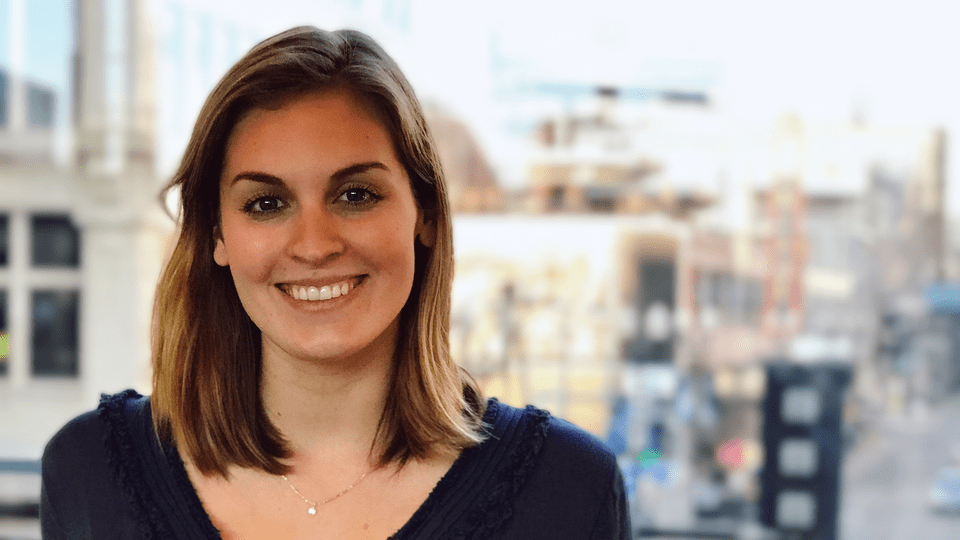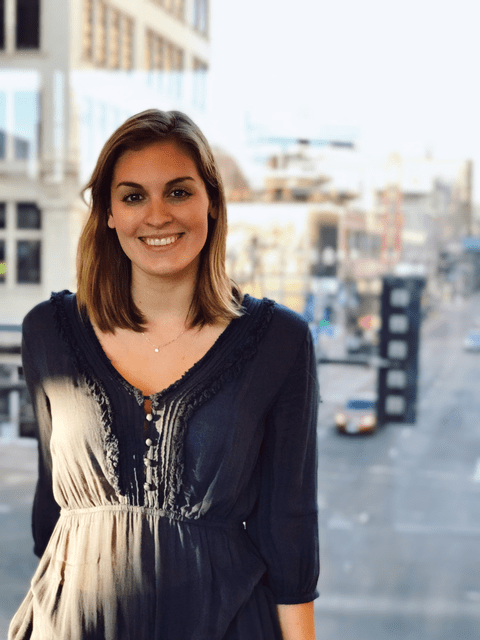Comps Insider: Interpersonal Experiences of People With Physical Disabilities
Hannah Aylward ’19 (Minneapolis) is majoring in sociology/anthropology (SOAN). She is a member of the Carleton Swim and Dive team, and is one of the Student Departmental Advisers for the SOAN department. She works as a researcher for an educational consulting company and enjoys traveling, eating, and playing with her two pet rats.

What is your major?
Sociology/Anthropology
What is the title of your Comps?
“When I’m in public, I never forget that I’m in a wheelchair:” Interpersonal Experiences of People With Physical Disabilities
What is your Comps topic?
My Comps investigates the existence and impact of microaggressions against people with physical disabilities. My research questions are:
- How do people with physical disabilities make meaning out of instances of microaggressions that they encounter in interpersonal interactions?
- Are certain interactions seen as malicious, while some are seen as inadvertent?
- More specifically, what kinds of interactions happen when people with physical disabilities are in public, and are these interactions meaningful?
For reference, microaggressions are “comments or actions that subtly and often unconsciously or unintentionally expresses a prejudiced attitude toward a member of a marginalized group.” Although this term was originally developed in the 1970s to refer to racial discrimination, it has since been expanded to other minority groups in the US, including people with disabilities. My research investigates the interactions and interpersonal experiences of people with physical disabilities (including microaggressions) in public.
I’ve only recently begun analysis on my interviews, but so far I have four main themes:
1. Attention/Discomfort
“They’re afraid to come up to you or something. So they just stare at you.” – Ben
The majority of my interviewees talked about their experiences of able-bodied people staring at them. Another common point of discussion was the tendency for able-bodied people to avoid interaction with people with physical disabilities. One of my interviewees had experienced this at his church, where some people will avoid interacting with him during the “meet and greet” time.
2. Competence
“They don’t all treat you as mentally disabled, but I think they all start out that way. Like, figure out if you’re there or not.” – Lily
My second theme refers to the phenomena of able-bodied people assuming those with physical disabilities also have mental disabilities. Aside from being irritating, this behavior also contributes to the difficulty some of my interviewees have in finding employment or engaging in romantic relationships.
3. Pity
“So I kind of stopped going to church for this very reason. Before I’d get out of the parking lot, people would be praying.” – Kayla
Many of my respondents talked about how some able-bodied people feel bad for them and try to compensate by being overly engaging. Several of my interviewees discussed being called an inspiration for doing nothing remarkable. Others talked about the common assumption that they are always in need of help. One interviewee recounted a time when he was called up to the front of the crowd at a community concert and was introduced to the audience for no reason.
4. Feelings/Reactions
“They make me feel inferior, insecure, awkward, uncomfortable, sad.” – Jasmin
The last category talks about my interviewees’ feelings surrounding the interactions, and what they do about them. A few of them talked about avoiding eye contact to stop potential interactions, or staring back at people who were staring at them. A common theme of discussion was viewing these interactions as a chance to educate the people who were making incorrect assumptions. However, others felt it wasn’t worth their energy. A general consensus was that these interactions themselves aren’t too serious, but they can pile on top of each other, and can eventually ruin your day.
Why did you choose your Comps topic?
My boyfriend lives with a form of muscular dystrophy and uses a power wheelchair. When we first started dating almost three years ago, I was exposed to ableism for the first time. On one of our first dates, we were walking down the street when someone walked up to my boyfriend and started praying over him. I was mortified, but his nonchalant reaction was, “Oh, don’t worry, this happens all the time.” At first I didn’t believe him, but sure enough, this scenario (and others like it) repeated itself again and again. Just a few weeks ago, we went out to dinner at a restaurant near Carleton. Before seating us, the hostess asked me, “Do you want a kid’s menu for him?”
These inappropriate interactions have become a normal part of my life, but unfortunately they haven’t been studied very closely, especially in the field of sociology. This is unacceptable, because, as one of my interviewees said, “The impact that bad interactions can have on your mental health is huge.” Forty million people in the US live with a disability. This is not a small-scale issue, and it deserves to be talked about.
What was the most interesting article or piece of information that you found while researching your Comps?
A researcher named Brianne Dávila wrote “Critical race theory, disability microaggressions and Latino/a student experiences in special education” in 2015. Her research focuses primarily on Latinx special education classes at a high school in southern California. Utilizing both in-depth interviews and participant observation, Dávila discovers three categories of disability microaggressions aimed at the students: low expectations, disregard, and bullying. In addition to this, however, Dávila found something even more important. Because these students experience a group-based learning approach in their classes, Dávila found that one microaggression affected all nearby students, not solely the student the microaggression was directed toward. These findings suggest that microaggressions are even more damaging than they may appear, as even microaggressions not directed at a specific student had an effect on that student.
What is your Comps process like?
I began by reading lots and lots of articles during the spring term of my junior year. Then, after finalizing my research questions and interview guide, I conducted 13 Skype interviews and 21 email interviews over the summer. Since then, I’ve been transcribing and analyzing the interviews for themes. I turned in my first draft last week, so I’ll have a lot of revising to do over winter break once I get feedback on it from my advisor.
Why do you think it is valuable for you to write a Comps?
The process of conducting my own research is entirely new to me. When I first decided to conduct interviews, I was incredibly nervous. Once I was armed with my interview guide, however, I felt more prepared. I became more and more comfortable with each subsequent interview, and I found myself really enjoying the discussions I was having. I have met so many incredible people through this project, and have learned more than I ever expected. Writing my Comps has given me confidence in my own abilities and skills, from research to communication to analysis. I’m so grateful to the SOAN department for supporting me and my classmates through these strenuous but rewarding projects.
Will you expand on your Comps in any way?
I hope to! I’m passionate about this topic both personally and academically, and I would love to engage with it more in the future.
